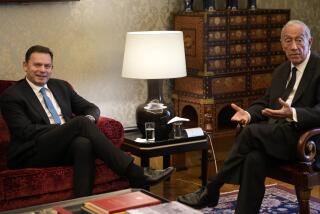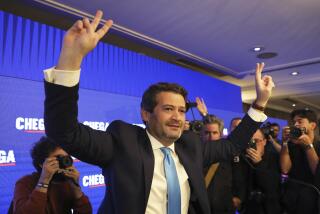POLITICS : Late-Blooming Portugal Faces Threat of Uprooting as Leaders Leave Office
- Share via
LISBON — An era is ending for Portugal, the late-blooming Atlantic nation that rocketed out of backwardness and dictatorship to become a star of the new Europe.
Mario Soares, the Socialist president who was doughty midwife to a new-founded Portuguese democracy, is serving his last year.
Across the political spectrum, Anibal Cavaco Silva, the free-market prime minister who made democratic principles work economically over a fruitful decade, is abandoning power even sooner.
Whether instability mars their remarkable legacies is emerging as the key national issue for Portugal.
A long, unsettling period of generational change begins next week when the center-right Social Democratic Party elects a new leader. By his own choice, Cavaco Silva, 55, is not a candidate. Neither will he seek a new term as prime minister in general elections later this year.
“It has been a long time; people are tired. Cavaco Silva believes it’s important to know when to leave,” said Fernando Lima, the prime minister’s spokesman.
Cavaco Silva’s back-to-back electoral majorities in 1987 and 1991 were the first in Portugal’s democratic history, short-circuiting a decade of weak minority governments that arose in the wake of prolonged dictatorship.
“Portugal today is a different country than the Portugal of 10 years ago,” said Cavaco Silva, an economics professor who has led Portugal to unprecedented growth--and latter-day disillusionment.
The poorest country in the European Union when it joined in 1986, Portugal has vaulted past Greece. Portuguese workers earned only about half the European average income 10 years ago; today they earn two-thirds.
Growth slowed with international recession in 1992, however, and has not resumed as vigorously as elsewhere in Europe despite privatizations, strong foreign investment and massive infrastructural aid from the EU.
Accusations of governmental corruption and inefficiency, combined with a sense of official stagnation, now dog Cavaco Silva while government ministries jockey for position behind his would-be successors.
Cavaco Silva vows to remain until his term ends in November, but he may not get the chance. By the end of next week, party leadership will have passed either to favorite Fernando Nogueira, the 44-year-old defense minister, or to 38-year-old Foreign Minister Jose Manuel Durao Barroso.
Once a new party leader is installed, the 70-year-old Soares, himself a former prime minister and consummate politician, could dissolve Parliament and call early elections, perhaps for June.
“The sooner the uncertainty ends, the better. Elections by summer are best for all, including for the new leader of Cavaco Silva’s party,” opposition Socialist Party leader Antonio Guterres said.
Guterres, a 45-year-old electrical engineer, is well-positioned to become Portugal’s next prime minister. His Socialists are center-left when measured against the center-right Social Democrats.
“Soares embodies democracy and stability, while Cavaco Silva is the symbol of economic development and relations within Europe. Whoever their successors, they must follow these same lines,” political analyst Alvaro Vasconcelos said.
Polls give the Socialists a strong lead over the Social Democrats, but it is not clear if Guterres could muster enough votes to install a majority government.
Portugal could tip back toward the noisy and wobbly minority government years that mortgaged national development after the 1974 overthrow of the Antonio Oliveira de Salazar dictatorship--not the best recipe for a still-lagging nation that needs to keep pace with rich European partners hurtling toward a new century.
Worse, a second test follows not far behind the first: a separate election to choose a president whose powers, while not as great as in the United States or France, are nevertheless far more than ceremonial.
This week, Lisbon Mayor Jorge Sampaio, a Socialist moderate, announced his candidacy to replace Soares.
*
By surrendering the prime ministry, is Cavaco Silva positioning himself to run for the presidency? Or will he test the proposition put to him by a visiting George Bush over lunch here recently that “there is life after politics”?
Either way, it may be almost another year if then before Portugal will again experience the political stability that has served it so handsomely over the last decade of rapid change.
More to Read
Sign up for Essential California
The most important California stories and recommendations in your inbox every morning.
You may occasionally receive promotional content from the Los Angeles Times.










